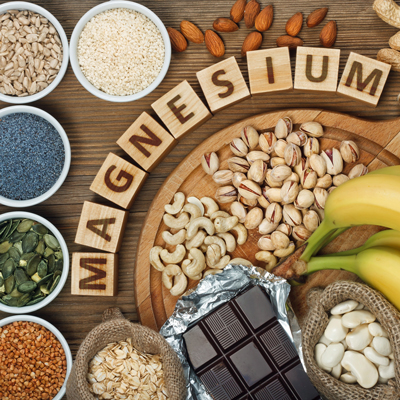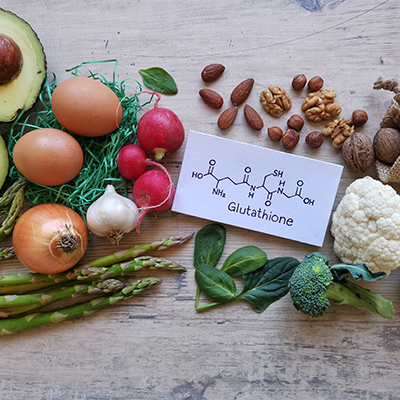Minerals
All information about "Minerals" and the related magazine articles can be found here.
Our articles are written clearly and link to scientific studies where relevant. This is how we meet our own standards: we regularly deliver new, high-quality content for you—free of charge, no sign-up required, with the highest possible benefit to you.

Iron deficiency anemia
Why iron is so important for your body
Have you ever wondered why your body sometimes feels more tired than the day actually warrants? Often, low iron stores can be the reason for your low energy levels. We'll show you how to replenish your reserves.

Alkaline diet
A gentle restart for more lightness
Discover the power of the 70/30 strategy. Alkaline foods support your body's own buffer systems and conserve your mineral reserves.

Vigorously through the flower beds
Your nutrient duo for fall
Anyone who tends flower beds knows that nothing works without strong soil. Collagen and Sango coral are like fertilizer and support at the same time. They give your body the foundation it needs to really blossom in fall.

Zinc & Selenium: Your support for men's health
The silent helpers for vitality and a strong immune system
Discover how zinc and selenium strengthen your health from within as essential building blocks. This guide shows you how to sustainably support your performance and resilience.

Children strong throughout the day
Immune system, energy, and everyday eating made easy
How to gently strengthen your child's immune system with colorful plates, bedtime rituals, and fresh air. Plus: When child-friendly multivitamins make sense and how to relax and fit them into your everyday routine.

Stay mineralized when it gets hot
Stay fit through the summer with calcium and magnesium from sango coral
If heat, sweating and circulatory problems are getting to you, a good supply of minerals is crucial. Find out here how calcium and magnesium from sango coral can support you naturally.

Start your vacation full of energy with potassium & magnesium citrate
How to keep you and your family fit, active and balanced even in the heat
On summer vacation, electrolytes such as potassium and magnesium quickly become unbalanced. This can affect energy, muscles and concentration. Find out here how you can strengthen your inner balance with smart nutrition and targeted supplements.

Playground power for every day
Calcium & vitamin K2: For bone health that grows with you
Whether romping around with the children or the daily balancing act between job and family - strong bones are the stable foundation. Find out how calcium and vitamin K2 can playfully help to strengthen your bones.

Spring cleaning for the body!
Drain naturally - with nettle, dandelion & potassium
Find out more about dandelion, stinging nettle and potassium to gently drain your body and get back on track with ease!

Stopping cravings: How chromium stabilizes your blood sugar levels
Find out why the trace element chromium can reduce cravings and how it supports your metabolism.
Chromium helps regulate blood sugar levels, helps prevent sudden hunger and promotes long-term wellbeing. Discover the benefits of this important nutrient and find out how you can specifically integrate it into your diet!

Strengthening the immune system in the cold season. Magnesium as a key mineral
Find out why magnesium is essential for a strong immune system and how you can optimally cover your requirements.
Especially in the cold season, magnesium supports the body's own defenses, ensures normal muscle function and helps to maintain energy. Discover magnesium-rich foods and practical nutrition tips for resilient health in winter!

Liver detox with L-glutathione: fresh energy for spring!
Gentle detoxification instead of a crash cure - how L-glutathione supports the liver
The liver filters toxins out of the body and optimally utilizes nutrients. But how can you strengthen it naturally without going on extreme detox cures? Discover here what glutathione has to do with the liver and which simple home remedies can help with “spring cleaning” from the inside.

Winter cabbage & iron: Powerful nutrients for the cold season
Find out how winter cabbage, vitamin C and iron-rich foods support your health and provide your body with optimum care.
Winter cabbage provides valuable iron, which is absorbed even better with vitamin C. Discover delicious recipes and nutrition tips to keep you fit and full of energy throughout the winter!

Sleeping problems in winter? How magnesium supports your sleep!
How magnesium can contribute to a relaxed night
Winter not only brings cold temperatures, but often also restless nights. Many people toss and turn in bed, struggle with muscle tension or wake up tired in the morning despite getting enough sleep. Magnesium is an essential nutrient that plays a role in muscle relaxation and the sleep-wake rhythm. In this article, you will find out which magnesium supplements are suitable for the evening hours and how you can promote a restful night's sleep with simple routines.

Is Moringa a real "superfood"?

These are the causes of hair loss
There are many different types of hair loss in men and women - and there are different ways to help your hair grow back. Find out more now.

Your nutritional timetable for pregnancy
The right diet is particularly important during pregnancy to ensure that the expectant mother and, above all, the baby are adequately supplied with all the important nutrients. Because nutrition can influence the baby's development! Valuable answers and tips can be found here.

Magnesium: How does it affect the menstrual cycle?
Many women are familiar with them and suffer from them every month: Menstrual cramps. Read more about the processes in your body during your period, discover natural approaches to relieve the pain and find out what role magnesium and other nutrients play in this. Improve your quality of life during your period in a completely natural way!

Heartburn - an annoyance and a burden!
Many people suffer from heartburn after a hearty meal. You have a glass of wine or beer, treat yourself to a nice dessert or even a little digestive liqueur - and there it is again: a sharp pain, pressure in the stomach and sometimes even nausea: heartburn!

Acidic foods
What is an acid-base balance? And how can I achieve it? Which foods are metabolised in an acidic way and which in an alkaline way? Our report answers the most important questions on these topics!

Calcium or calcium - the important thing is to take it!
Find out what this important mineral is involved in in the body and which is the better form of calcium here!

How a detox works
The human body works around the clock to eliminate harmful substances and toxins. But when there are too many toxins in the system, it needs help.

When the immune system needs a boost
Our immune system is usually good at fending off invaders. But how can we strengthen it so that it continues to work well under high levels of stress?

The effects of the yam root
Yam is a staple food around the world. The yam is a staple food in many parts of the world, similar to the potato.
Minerals - more here, less there!
Everyone has heard of minerals, micronutrients and vitamins in connection with food. But do you know why we actually need these active ingredients so urgently? Read more here about their tasks and the foods that should not be missing from your diet!
What are minerals?
These are inorganic nutrients that the body needs in addition to vitamins to maintain various vital functions. They are essential for the proper functioning of the metabolism, growth, development and general health. Minerals and trace elements include substances such as calcium, magnesium, potassium, sodium, phosphorus, sulphur, iron, zinc, copper, manganese, selenium, iodine and many others.
A distinction is made here between macroelements (minerals), which the body needs in large quantities, and micronutrients (trace elements), which are only found in small quantities in the body but are nevertheless essential for a functioning organism [1].
These minerals and trace elements have many roles in our bodies, including regulating enzyme activity, building bones and teeth, controlling electrolyte balance, promoting healthy muscle function and supporting the immune system. A balanced diet with high-quality foods is crucial to meet the requirements and avoid deficiency symptoms and health problems, also with regard to vitamins.
What are the most important minerals?
The most important macrominerals for the human body are [2]:
- Calcium (Ca): Important for bone health, muscle contractions, blood clotting and nerve function. Further information can be found here!
- Magnesium (Mg): Involved in over 300 enzymatic reactions in the body, including energy production, muscle and nerve function and bone health.
Potassium (K): Regulates fluid balance, supports muscle contraction and ensures stable blood pressure [3].
Sodium (Na): Necessary for maintaining fluid balance and electrolyte balance in the body.
Phosphorus (P): Important for bone health, energy production, DNA and RNA synthesis and many other metabolic processes.
The most important trace elements for the human organism are:
- Iron (Fe): Necessary for oxygen transport in the blood, energy production and the immune system.
Zinc (Zn): Supports the immune system, wound healing, DNA synthesis, metabolism and growth. Find out more here.
Copper (Cu): Involved in iron metabolism, the formation of connective tissue and the production of neurotransmitters.
Manganese (Mn): Important for bone metabolism, energy production and antioxidant defense.
Selenium (Se): A powerful antioxidant that supports cell health, regulates thyroid function and strengthens the immune system. We report on the effects of selenium in more detail here.
Iodine (I): Necessary for the production of thyroid hormones, which are important for growth, development and metabolism [4].
In addition to vitamins, these nutrients have many crucial tasks for optimal health. A balanced diet with minerals, trace elements and vitamins can ensure that we get all the active ingredients we need. Make sure you eat foods that meet your requirements for the most important nutrients!
Why does the body need minerals?
Minerals are essential for the proper functioning of the body and for maintaining good health [5]. Deficiencies in key minerals and vitamins can lead to a variety of health problems, while adequate consumption helps to prevent these problems and support the optimal functioning of the body. Therefore, always pay attention to the nutrients in your diet.
- Structural support: Calcium and phosphorus are important components of bones and teeth. They give these tissues their strength and structure.
- Functional support: Alongside vitamins, minerals are crucial for many biochemical processes in the body. They act as cofactors for enzymes that catalyze chemical reactions required for metabolism, energy production, cell function and many other vital functions.
- Electrolyte balance: Minerals such as sodium, potassium and chloride are electrolytes that are important for maintaining fluid balance, muscle contraction, nerve conduction and the regulation of acid-base balance in the body.
Oxygen transport: Iron is an important component of haemoglobin, the protein in red blood cells that binds oxygen in the blood and transports it through the body. You can find more interesting information on this topic here!
Immune function: In addition to vitamins, trace elements such as zinc, selenium and copper play an important role in strengthening the immune system and defending against diseases.
Cell health and function: Minerals such as magnesium and zinc are essential for cell health and function, including DNA synthesis, cell division and cell protection from oxidative stress.
Hormone balance: The trace element iodine is an important component of thyroid hormones.
Which foods contain a lot of minerals?
A varied diet of foods such as fish, meat, fruit and vegetables can ensure that the body is supplied with the amount of minerals and vitamins required for optimal health and function.
- Green leafy vegetables: Spinach, kale, chard and rocket are rich in Ca, Mg, F and K.
- Pulses: Beans, lentils and chickpeas are good sources of Fe, Mg, K and Zn.
- Nuts and seeds: Almonds, walnuts, sunflower seeds and pumpkin seeds contain Mg, P, K and Zn.
- Wholemeal products: Oats, quinoa, brown rice and wholemeal bread are rich in Mg and P, but also in vitamins of the B group!
- Dairy products: Milk, yogurt and cheese are excellent sources of Ca, P and Zn.
- Fish and seafood: Salmon, mackerel, mussels and prawns contain plenty of Mg, P, K and I.
- Lean meat: Poultry, beef and pork are good sources of Fe, Zn and P.
- Fruits: Bananas, oranges, apples and avocados are rich in K and also contain Mg and other minerals.
- Vegetables with red color: Tomatoes, red peppers and beets are rich in K, Mn and other minerals.
- Sea vegetables: Algae such as nori, wakame and kombu are rich in I, Mg, Ca and Fe. Find out more about the outstanding properties of brown seaweed in this article!
What happens in the event of a deficiency?
A mineral deficiency, like an insufficient supply of vitamins, can have various effects on the body, depending on the severity and duration of the deficiency. In some cases, it may be necessary to take dietary supplements to cover the need for certain minerals, especially if a balanced diet is not guaranteed or if there are health problems.
- Weakening of the bones: A calcium and vitamin D deficiency can lead to a reduction in bone density, which increases the risk of osteoporosis and bone fractures.
- Muscle weakness and cramps: A lack of magnesium, potassium or calcium can lead to muscle cramps, muscle weakness and uncontrolled muscle contractions.
- Tiredness and lack of energy: A deficiency of iron, magnesium or other minerals that are important for energy production in the body can lead to tiredness, lack of energy and general weakness.
- Digestive problems: A lack of magnesium can lead to digestive problems such as constipation, as magnesium is important for muscle contractions in the digestive tract.
- Increased susceptibility to infection: A deficiency of minerals such as zinc and selenium can weaken the immune system and increase susceptibility to infections.
- Disorders of the electrolyte balance: A lack of sodium, potassium or chloride can lead to electrolyte imbalances, which can result in dehydration, muscle weakness, confusion and other symptoms.
- Anemia: A deficiency of iron, vitamin B12 or folic acid can lead to anemia, a condition in which the red blood cells cannot transport enough oxygen.
- Growth and development disorders: For children, a deficiency of certain minerals and trace elements such as calcium, zinc or fluoride can lead to growth disorders, dental problems and developmental delays.
- Hormonal imbalance: An iodine deficiency can lead to hypothyroidism and a general hormonal imbalance, the consequences of which can include a slower metabolism, fatigue, obesity, loss of appetite, depression and digestive problems.
Sources:
[1] https://www.msdmanuals.com/vitamine-und-mineralstoffe
[2] https://www.msdmanuals.com/mineralstoffübersicht
[3] https://www.ncbi.nlm.nih.gov/PMC4816263
[4] https://pubmed.ncbi.nlm.nih.gov/29187856
[5] https://www.msdmanuals.com/mineralstoffe-im-überblick
